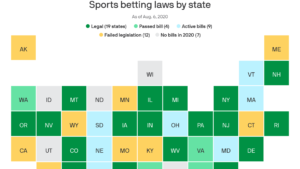Legal Sports Betting
Several states have passed laws to legalize sports betting, and more are expected to follow suit in the near future. This is an exciting time for sports betting enthusiasts across the country. With the Supreme Court ruling that PASPA is unconstitutional, states can now regulate sportsbooks. And states that are able to legalize sports betting will enjoy the added benefits of additional tax revenue and increased competition. These are just a few of the reasons why legalized sports betting is such a hot topic for state lawmakers.
In the past, sports betting was legalized in just a few states, but since the SCOTUS ruling, a number of states have made the jump. These include: Vermont, Colorado, Nevada, New Mexico, Oklahoma, Iowa, Arkansas, Mississippi, and Kentucky. And while the legal sports betting market in these states is still nascent, they are working to install the necessary infrastructure and regulatory structures.

In May 2018, the Supreme Court ruled that the 1992 Professional and Amateur Sports Protection Act, or PASPA, was unconstitutional. This meant that states now have the authority to regulate sportsbooks, although the number of states with legal sports betting has yet to surpass the 40-member House of Representatives. The Supreme Court ruled that the best way to go about regulating sports betting was to enact legislation. Then, the federal government would have to abide by these regulations.
States With Legal Sports Betting
In the past year, more states have passed sports betting laws than ever before. And with the advent of online sports betting, the sports betting landscape has changed dramatically. States with legal sports betting can now offer sports betting in their state, either through brick and mortar locations or through their state lottery.
While some states are working on implementing the legal sports betting legislation and infrastructure, others have not. For instance, Maine is considering legalizing sports betting. The state legislature approved a sports betting bill last year, but it is still pending final passage in the Senate. The bill would tie sports betting apps to existing gaming facilities.
New Mexico was the sixth state to legalize sports betting. The state will offer mobile betting and retail locations in the near future. The legislature also passed a budget for 2021, which includes sports betting revenue. In 2022, Colorado will begin offering sports betting. While the state has not yet decided whether or not to offer online sports betting, the state has signed an agreement with four mobile sports betting operators. The list of states with legal sports betting is growing daily, and more are expected to follow suit in a few years.
In the meantime, other states are debating their own sports betting laws, and looking for the best sports betting options. For instance, Indiana recently legalized sports betting, and it is now available in retail locations as well as on mobile devices. New York will also launch sports betting in 2020, and has several options for sports betting.
Another example is Massachusetts. While it is still too early to tell whether or not the state will ever legalize sports betting, the state legislature did include a sports betting revenue figure in their 2021 economic plan. The state’s most recent bill, SB 655, is the most comprehensive sports betting bill to date. It authorizes sports betting on riverboats and authorizes sports betting online. In addition, it includes a 2% administrative fee for the Gaming Commission Fund. The bill also includes a data mandate.